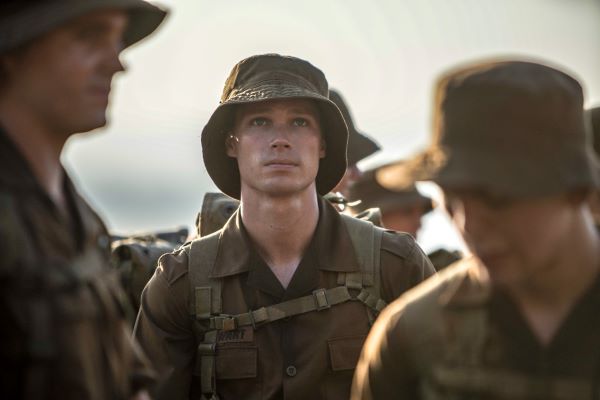

Oliver Hermanus’s Moffie (an Afrikaans slur for “gay”) bluntly as well as subtly takes on sexuality, masculinity, and the contagious paranoia that permeated white South Africa in 1981.
Rather than paint an be-all and end-all portrait of the apartheid era, Hermanus takes his cue from his source material, André Carl van der Merwe’s 2006 autobiographical novel, which follows a white gay teen’s nightmarish tour of duty. The film explores how a reactionary and doctrinaire mindset distorts the life of a farm boy, who, at first glance, would appear to rank among the country’s most privileged.
As directed by a mixed-race, openly gay director, this intense immersion into the South African Defense Forces centers nearly exclusively within a unit of white teens. All have been conscripted as part of a mandatory two-year military service to fight the Communist government of Angola. The pressure for the soft-spoken, delicate featured Nicholas van der Swart (Kai Luke Brummer) to live up to specific and limited expectations of behavior begins even before he leaves home: his father hands him a porn magazine as a going-away present. (That dad may have an ulterior motive for this particular pictorial becomes clearer later on.)
At boot camp, Nicholas and the other recruits run ragged through a gauntlet of humiliations and scalding verbal abuse. Nicholas keeps his head down, eyes averted, and follows the rules, trying to become as invisible as possible; he has seen how the drill sergeant—who, if he didn’t have a tan, would have a perpetually red face from all of his machismo histrionics—purposely targets the less fit and psychologically vulnerable. Primarily an English speaker, Nicholas is a minority in the barracks, where Afrikaans dominates. As though confirming his outsider status, Nicholas hums in a private moment “Sugar Man,” the 1970 rock ballad by the American singer Rodriguez that somehow became an underground hit in South Africa in the 1970s and ’80s and the subject of the Academy Award-winning documentary Searching for Sugar Man (2012).
The short and sharp vignettes of basic training shove viewers into the rites of initiation, often set to a striking, dissonant score by Braam du Toit. Like Nicholas, they are thrown for a loop, not knowing what comes next. A chaotic, handheld sequence of the men stripping off their clothes and running from one inspection to another contrasts with calmer moments of languid, slow-motion shots accompanied by Charles Ives, Vivaldi, or Schubert, reprieves from the physical and emotional violence. (Any comparison to Claire Denis’s sensual, military-set Beau Travail, with its lingering shots of male bodies in motion, are too pat. The two films undertake different missions.) The film’s centerpiece is a bravura piece of filmmaking, a seemingly single tracking shot of a flashback to Nicholas’s adolescence, a summer afternoon that begins benignly and turns horrific.
Similar to other hellish military-based films involving brutal bullying, Moffie is more concerned about the inflicted psychological scars than the battlefield, although a confrontation does take place toward the end when Nicholas comes face to face with a Black counterpart, also young and shell-shocked. Throughout, Hermanus builds a concrete connection between the dehumanizing of the government’s enemies (the majority Black population, gays, and Communists, all of whom are the target of the drill sergeant’s venom) and the fear-based ideology underlining apartheid.
Though the focus remains largely within a white bubble, the film touches, perhaps too briefly, upon the larger, outside world as a lone Black bystander on a train platform is struck with debris and verbal slurs by a mob of white conscripts, who remain safely on the train bound to boot camp. By centering its story lines around Nicholas, though, the film stays mainly confined within his world without comparing or equating his pain to those of others.
Ultimately, if Nicholas comes across as adrift, that’s purposeful. As a way to survive, he has chosen to become inconspicuous and closed down. Yet those viewing the movie at home have an advantage: they can replay the closing scene. The answer to how the film concludes may just lie in a small look or gesture.






Leave A Comment